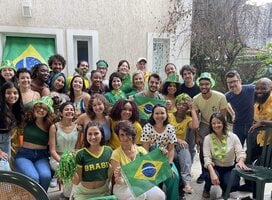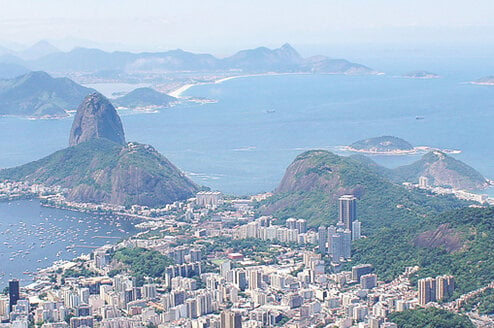Study Abroad in Sao Paulo, Brazil
If Brazil were a float in a Carnivale parade, Sao Paulo is the fast car underneath.
Sao Paulo is the industrial and fiscal behemoth that drives Brazil’s economy, although this bumpin’ metropolis also knows how to throw a party.
As the largest city in South America, Sao Paulo is as diverse and vibrant as New York or Tokyo. A few years back it had the highest crime rate in Brazil, however with a lot of elbow grease, it's transformed into one of the most vibrant and underrated destinations in the country.
The city, which is fondly referred to as "Sampa" or "Cidade da Garoa" (city of drizzle), is known for its unreliable weather, the size of its helicopter fleet, its cuisine, traffic congestion and its endless jungle of skyscrapers.
It is common to hear that the people in São Paulo work while the rest of Brazil relaxes. It’s a fact that the city of Sao Paulo alone is responsible for 15% of the country's gross national product. But study abroad students shouldn’t be scared of the serious façade-- when Paulistanos are not working, they are dancing, eating, and basking in the culture of the city. The nightlife in Sao Paulo is as intense as it gets, which makes going out to experience the town a total must-do.
Studying abroad in Sao Paulo is overwhelming, intense, gritty and spectacular. Students should buckle up for a ride in one of the greatest cities on Earth.
Photo credit: Artur Luiz dos Santos
Culture and Immersion
Sao Paulo is a city of immigrants, and visitors are often surprised at the diversity of languages and cultures. Portuguese speakers will notice a slight Italian lilt to the Sao Paulo dialect, due to the 6 million Paulistanos of Italian decent. São Paulo also has the largest Japanese population outside of Japan. It’s also home to large Korean, Chinese, Arab and Jewish communities.
Nowhere is this multiculturalism more reflected than in the city’s food. São Paulo has an incredible diversity of restaurants and cuisines. The fast-food chain Habib's, which originated in São Paulo, is a favorite of Paulistanos serving "Arab-Brazilian" snacks
Another typical food in São Paulo is the Virado à Paulista, which consists of rice, tutu de feijão (a paste of beans and manioc flour), sautéed collard greens and pork chops. It’s usually accompanied by pork rinds, bits of sausage, a fried egg and a fried banana. It may be a heart attack waiting to happen, but you’ll die happy.
Another typical type of restaurant in São Paulo, are the world famous churrascarias where waiters circle the tables and present customers with an array of meats on huge skewers. In those places, you can eat as much as you want, paying a flat fee. This system is called rodízio, and it has been very successful in the city, spreading to other types of cuisine like Italian, where you can find rodízio de pizza and Japanese, with rodízio de sushi
Affordability
São Paulo is a megalopolis of 11 million- with the very rich and very poor living side by side. Students on a budget will have no problem finding deals, and those who want to splurge can get anything their heart desires.
A typical lunch will cost R$ 15-25 ($6-10 USD), a cappuccino around R$ 4 ($1.75 USD) and a chopp,or beer, costs around R$5.
Culture Shock and Support
Many male expats find it easy to adjust to Brazilan culture while female expats find it a bit more difficult. Like many Latin American countries, Brazil is dominated by a machismo culture that American students find a little strange.
Perhaps the biggest factor when moving to Brazil is social inequality. Brazil may be a world economic powerhouse, but the disparity between rich and poor is blatantly obvious. Huge slums, or favelas, are visible in most large cities.
While the city has become leagues safer over the past ten years, students studying abroad in Sao Paulo should still be on their toes. You should avoid walking in deserted areas at night, or at least avoid walking alone. Buses are reasonably safe, but waiting alone at a bus stop at night is not. Be extremely careful when using ATMs at night (or better, avoid them entirely if they are located in a deserted and dark corner). If you are driving at night, when stopping for whatever reason (even at a traffic light), check your surroundings. If possible, when going back late, take a cab or ride with a group of friends. During the day, keep valuable objects away from windows (even if you are using a taxi).
Scholarships are a great means for lessening the financial burden of a semester abroad. Here's just the beginning!
- The Boren Awards provide up to $20,000 to students to study in areas of the world that are critical to U.S. political interests.
- More Study Abroad Grants and Scholarships









